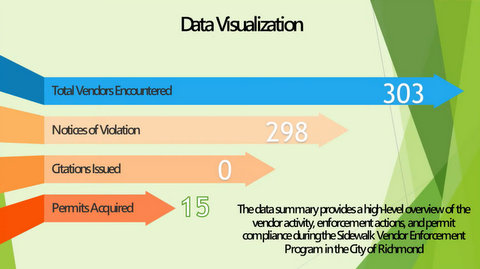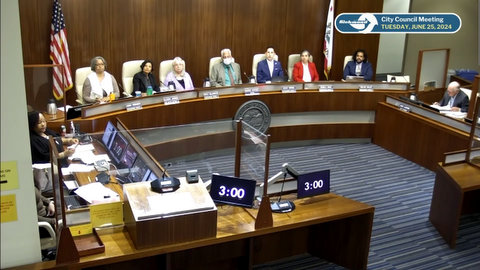
09 Jul Richmond Struggles to Enforce Street Vendor Rules

(Screenshot captured by Samantha Kennedy / The CC Pulse)
By Samantha Kennedy
One year since the Richmond City Council imposed new sidewalk vendor regulations in response to community concerns, vendor compliance has increased, but the data and the city’s enforcement is still limited.
Council members at the July 1 meeting voted to explore changes in how violations are penalized and consider clarifying where vendors could set up. Additional rules that could help legacy vendors continue to operate will also be explored.
“There were street vendors long before we had an ordinance. The ordinance didn’t fit the vendors who were here before, so we need to look at how the ordinance affects the vendors we have,” said Mayor Eduardo Martinez. “There are a lot of solutions we need to consider.”
The initial regulations came after state lawmakers decriminalized sidewalk vending in 2018, which allows cities to issue administrative citations if vendors are not following permit, health or other operational regulations.
Business owners with the 23rd Street Merchants Association pushed for a city-specific ordinance after raising concerns that vendors were operating without permits and taking away economic opportunities for traditional businesses.
Since enforcement began in August 2024, the number of monthly unpermitted vendors has dropped by around 40, according to an update from the public works department. In that same time, 15 special business licenses have been issued.
The concentration of vendors included several along the 23rd Street corridor, Hilltop Mall, Civic Center and San Pablo Avenue, Macdonald Avenue, Cutting Boulevard, Central Richmond and Miller/Knox Regional Park.
Under the city’s ordinance, 298 notices of violations to vendors have been issued. But the violations, which could potentially amount to thousands of dollars, have collected $0 in fines because of challenges in identifying vendors and the limited authority to compel people to pay.
“As a result, monetary penalties have had limited deterrent value, particularly with non-cooperative vendors,” Andy Cho, an engineer with the city; Daniel Chavarria, director of public works; and Robert Armijo, deputy director of public works, said in their report.
Cho said at the meeting there is also only one full-time inspector on the streets daily, which makes effective enforcement a challenge.
“We are doing our best to cover all seven days, but there is a limit to how much we can cover,” he said.
The inspector, a contractor through an agreement with 4Leaf, which provides code enforcement services, also faces a challenge when issuing violations because they are not legally authorized to request personal information, Chavarria, Cho and Armijo said in their report.
Vendors are often also hesitant to give identifying information, in part because of concerns with immigration enforcement, making issuing fines “nearly impractical,” said Cho.
The three suggested the city explore enforcement tools outside of fines because of the challenges.
Fines for unpermitted vendors currently range from $250 to $1,000 and, for other operational violations, $100 and $500. Council members adopted the fines alongside the initial vendor regulations to support the implementation of the program.
“Persistent field presence” and “non-punitive outreach” — that is, having an inspector out on the street and multilingual materials informing vendors of regulations — have been more effective in encouraging compliance with regulations, staff said.
Vendors operating on city streets are in addition to the 10 who participate in the program known as The Lot: Downtown Richmond Food Court. Previously known as the Mobile Vendor Program, it gives vendors the platform to sell from two farmers’ markets or the parking lot by the BART station. The program helps vendors operate their businesses in a way that ensures they are in compliance with regulations.
Council approves pilot community maintenance crew
A recently approved pilot community maintenance crew could bring cleaner neighborhoods and a public works department with increased capacity to the city.
Council members at the July 1 meeting approved the development of the crew, to be launched under a nonprofit partner, that will help clean neglected areas across the city of litter, graffiti and illegal dumping.
“While I know we are committed to improving staff, especially within public works, this pilot gives time and space to hire those full-time employees,” said council member Jamelia Brown, who brought the item forward. “But in the meantime, we must take action that residents will see and feel immediately with clean streets and responsible government.”
The pilot is estimated to cost $190,600 for around a dozen workers over the course of 26 weeks. Those workers will work seven days a week, Brown said, with paid workers during the week and volunteers over the weekends. Transitional-aged youth, usually considered those between the ages of 18 and 24 who are transitioning from being a youth to a young adult, will be prioritized in that hiring.
During the pilot program, Brown said the city will hire four full-time employees in the public works department.
Only Mayor Eduardo Martinez and council member Sue Wilson voted no on the pilot.
Wilson, who said she had been in talks with the union representing city workers, SEIU 1021, said it was her understanding that the union did not support the pilot.
“I love the idea of this … but one of the things I have an issue with is about outsourcing this job,” she said. “This is something that public works should be doing, and we should be hiring more people to be able to do this within the city.”
Brown said she previously removed the pilot for consideration at another meeting because the union said it had to withdraw its support.
“I continued the item because I wanted to make sure that, with respect, I wanted to make sure that I was crossing my t’s and dotting my i’s,” Brown said.
Council member Claudia Jimenez, who ultimately ended up lending her support to the pilot, raised concerns that it might take longer than expected because of anticipated delays from legal obligations during union negotiations.
City Manager Shasa Curl told council that there was likely a “90%-plus” chance that requirement, known as meet and confer, would be necessary following the approval by the council.
At the request of council member Doria Robinson, a nonprofit leader herself, council also approved the incorporation of professional development for youth workers.
“That’s where I feel nonprofits really bring their strength in treating the whole person, having to be less transactional and really helping somebody grow into empowered people,” she said.







No Comments